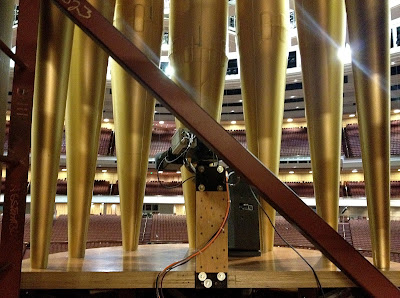5 manuals! And all those stops!
I took Abraham with me to the workshop, and we had the best time. There were probably 25 or 30 of us there. It was SO interesting to see the organ and the pipes (there are nearly 8000 of them) up close. Amazing to sit up in the choir seats of that hu-normic (or gigantimous, or whatever it is--my kids always get these words wrong and I'm starting not to know the true ones anymore) building and look out at the 21,000 seats. Awesome to hear Brother Longhurst demonstrate the varied capabilities of that imposing instrument. And MOST AMAZING of all to hear MYSELF producing that unmistakable pipe organ sound in that vast room---regal, full-bodied, resonant, magnificent. Brother Longhurst walked around me pulling out stops as I played, choosing registration that made me sound way better than any combination I would have known how to create myself. I played on each of the manuals (though not all at once). What an experience. It was unforgettable.
Abe, of course, was just as fascinated with everything as I was. He liked the different background lights the organist can select:
The tallest pipe is 40 feet tall!
And we both greatly enjoyed getting right up next to the pipes and peering through to see the rows and rows of pipes behind.
Like this
And this. Note the wooden pipes here---these make the woodwind sounds on the organ.
Abe didn't play, but got to sit at the organ. He particularly liked the "secret drawer" with a midi recorder in it, and the little blower tubes that can blow air on the organist if he gets too hot under the bright TV lights.
After the workshop ended, there were only a few of us gathering our stuff together, and Bro. Longhurst offered to take us to see back behind the pipes. Of course we jumped at the chance. (Abe: literally.) We got to go back through secret tunnels and elevators (secret to us, anyway!) and then into the organ casing. We climbed up through a trapdoor:
where we could see some teeny-tiny pipes like these (the smallest pipe on the organ is 3/4" long!)
Another narrow door brought us in to where we could walk all along a thin passageway to different divisions of the organ, tiptoeing around blowers and pipes and wires and casings. Abe and I kept whispering to each other, "Can you believe we're actually doing this?" It was so cool and so fascinating.
And here is my favorite picture of all: looking out at the conference center seats from behind the organ pipes!



































.JPG)

.JPG)
















